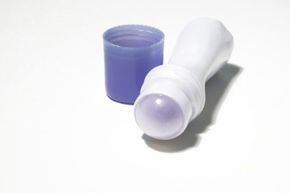It's frightening to think that applying deodorant or antiperspirant, something many people do every day, could cause breast cancer. You may have heard about the possible link between deodorant and breast cancer and recent studies that have investigated this claim. The concern is that parabens, preservatives used in some deodorants and antiperspirants, and aluminum, an active ingredient in many antiperspirants, can cause breast cancer [source: National Cancer Institute].
Parabens are the most widely used preservatives in the cosmetics industry; however, they're rarely used in deodorants and antiperspirants [source: National Cancer Institute]. Parabens have been at the center of some cancer studies because they have estrogen-like qualities. Because estrogen can promote the growth of breast cancer tissue, some researchers are concerned that parabens may have the same effect when absorbed through the skin. Scientists were particularly concerned about parabens in antiperspirants and deodorants because they're applied near breast tissue [source: National Cancer Institute].
Advertisement
A 2004 study revealed that parabens can build up in breast tumors -- the study found parabens in 18 of 20 samples of tissue from human breast tumors [source: Whelan]. However, the study didn't test healthy breast tissue, so there's no conclusive evidence that paraben buildup caused the tumors. Neither the National Cancer Institute nor the U.S. Food and Drug Administration has found evidence that parabens in antiperspirants or deodorants cause cancer [source: National Cancer Institute].
Aluminum compounds, such as aluminum zirconium and aluminum chloride, are used in many antiperspirants to shrink sweat glands and prevent wetness [source: Bruno]. Like parabens, these compounds have estrogen-like properties, and some scientists are concerned that aluminum could be absorbed through the skin and promote the growth of cancer cells [source: National Cancer Institute]. A 2007 study measured the aluminum content of breast tissue from 17 breast cancer patients and found that the aluminum levels were higher in the outer regions of the breast, in close proximity to where antiperspirant would be applied [source: Medical News]. However, the aluminum content of healthy breast tissue wasn't tested.
Scientists say more testing must be completed to make a conclusive ruling about the connection between tumors and parabens and aluminum -- but at this point, they say there's little cause for concern [source: National Cancer Institute , National Cancer Institute]. For more information, see the links on the following page.
Advertisement

